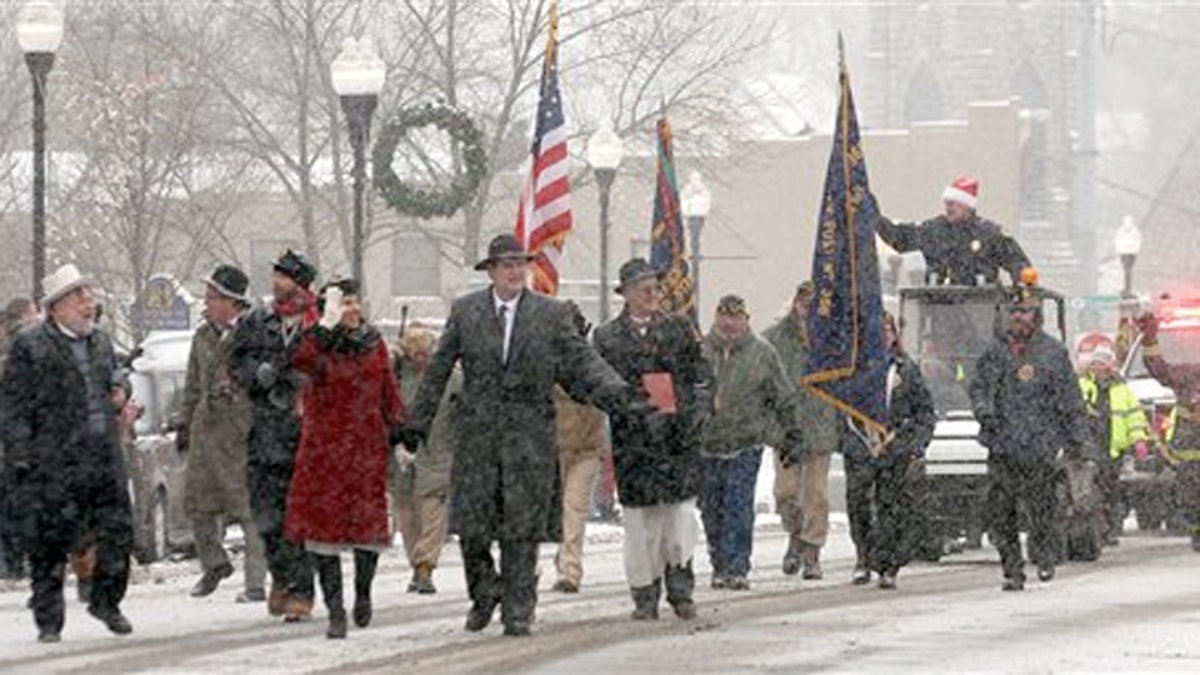
Dec. 14, 2013: Actors in "It's A Wonderful Life" movie costumes walk in a parade through the village of Seneca Falls, N.Y. (AP)
Is this where George Bailey lived his wonderful life?
Folks in this quaint upstate New York town think so.
Or more precisely, they say Bailey's make-believe hometown of Bedford Falls in "It's a Wonderful Life" — including the main street and the steel truss bridge — was heavily inspired by Seneca Falls.
This cannot be proven, and director Frank Capra never confirmed such a connection. But that hasn't stopped locals from celebrating the beloved movie every December, complete with actors dressed as Clarence the Angel and mean old Mr. Potter parading down a main street gussied up to look like Bedford Falls.
"Capra always said Bedford Falls represented little slices of small towns that he had visited all across America. We're not in a position to dispute that," said Francis Caraccilo, a trustee for the Seneca Falls It's a Wonderful Life Museum. "We just think we're a bigger slice."
Capra's 1946 film stars Jimmy Stewart as George Bailey, a small-town, frustrated banker who realizes his life's value after Clarence shows him what would become of Bedford Falls if George had never been born.
The homey town falls into the clutches of the greedy slumlord Potter, and his Pottersville becomes a city of sin, brimming with sleazy nightclubs, burlesque halls, pawn shops and neon lights.
If Bedford Falls (the nice one, not the naughty one) really was modeled after Seneca Falls, Capra never let on, and died in 1991. But many in this town of 9,000 say they have a strong circumstantial case.
Seneca Falls has a nice broad main street like Bedford Falls', and there's a bridge with a plaque dedicated to a man who jumped from the span to save a suicidal woman in 1917 — an act echoed in the film.
Karolyn Grimes, who played George's daughter Zuzu in the movie and is a festival regular, said Seneca Falls' similarities are so striking she blurted out "It's Bedford Falls!" during her first visit.
The film also is loaded with references to nearby upstate cities. The bank examiner wants to get back to his family in Elmira for Christmas. George's wealthy friend Sam Wainwright talks of building a factory outside of Rochester, and his brother is offered a job in Buffalo. Bedford Falls also has a Genesee Street. The word "genesee" is from the local Iroquois and is closely associated with the Finger Lakes region that includes Seneca Falls.
And while there's no slam-dunk proof that Capra ever set foot in Seneca Falls, there is the haircut story.
Local barber Tommy Bellissima claimed he cut Capra's hair in 1945. Bellissima, who died in 2011, didn't initially know the customer he chatted with was famous, but the surname Capra stuck in his head because it means "goat" in Italian. The story is that Capra had been on his way to visit an aunt nearby.
Maybe fitting for a Christmas story, the contention that Seneca Falls is the real Bedford Falls comes down to belief.
"There just is no evidence to support it, but God bless them," said Jeanine Basinger, curator of the Frank Capra Archive at Wesleyan University and author of "The It's a Wonderful Life Book."
Basinger said Capra was a meticulous record keeper, yet she has never come across the link in Capra's records, his diary entries or script notes — not to mention the many conversations she had with Capra over years.
"I hate being in the role of Mr. Potter. I'm sorry, everybody. I wish I could say: 'Eureka! And here it is!' But the fact is there is absolutely no evidence to confirm this," Basinger said.
It's also possible that Capra might have known of Bedford Hills, a hamlet in the moneyed bedroom community of Bedford (think Sam Wainwright) north of New York City. But Evelyne Ryan, executive director of the Bedford Historical Society, said that the place is not similar to Bedford Falls and that a case has never been seriously made.
It's also possible Bedford Falls was meant to be an ideal, not a place. Basinger notes the great thing about "It's a Wonderful Life" is that everyone feels it's their hometown. And that's just fine to some Seneca Falls partisans.
"We're OK not having proof. In fact, maybe having a little mystery behind it makes it even better," Caraccilo said. "Keeps the magic going."
